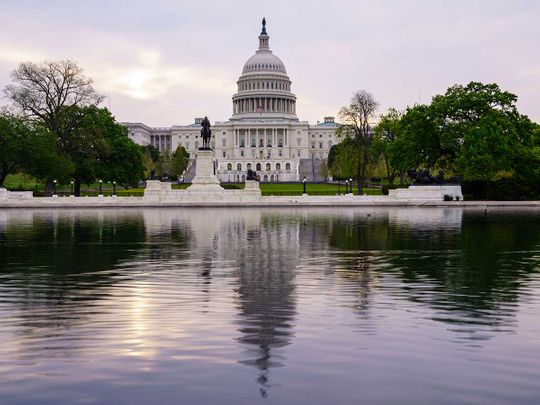
Washington: A perk of the presidency is the chance to deliver a speech to Congress, and millions of Americans, soon after taking office.
On Wednesday, President Joe Biden will finally do just that, giving his first address to a joint session of Congress, which had been delayed by his administration’s early push to confront the coronavirus pandemic.
Part victory lap and part sales job, the speech will let Biden mark the nearly 100 days he has spent in the Oval Office by describing his efforts to vaccinate Americans and revive the economy, aides said. But he also plans to seize the moment to pitch a broader agenda, laying out his proposals to upgrade the nation’s infrastructure and expand public benefits.
Because of the pandemic, Biden will deliver his speech to a pared-down, socially distanced group of lawmakers and administration officials - a far cry from the tightly packed House chamber of previous years. But the goal will be similar: Make your pitch to the public with the bully pulpit of the presidency.
Here’s what we expect him to say:
Vaccination
Biden’s pledge to deliver vaccination shots to 100 million people in the first 100 days of his presidency was at the centre of his campaign. On Wednesday, Biden can say he beat that pledge; more than 200 million shots have been given since he took office.
The president says the country is at war against the virus - and he has not won all the battles. Manufacturing problems, concerns about side effects and millions of people who remain hesitant to take the vaccine threaten to undercut Biden’s hopes that the country can return to some kind of normal life by the Fourth of July.
But in his speech, Biden will focus on the positive, that about 43% of Americans have received at least one dose of a COVID-19 vaccine and nearly a third are fully vaccinated.
Economy
The president failed on his promise of a bipartisan effort to begin repairing the economic damage from the pandemic. The $1.9 trillion American Rescue Plan passed Congress with no Republican support, using a budgetary manoeuvre that allowed Democrats to push it through anyway.
But in his speech, Biden will focus less on who voted for the legislation and more on whom it helped, such as the families who got $1,400 checks, the unemployed and small businesses that received grants.
His message: The government acted at a moment of need for Americans, when the worst health crisis in more than 100 years threatened economic disaster.
Rescue plan
He will also argue that the American Rescue Plan wasn’t enough. In his address, Biden will urge support for a fundamental overhaul of the nation’s priorities, including a $2.3 trillion infrastructure plan and at least $1.5 trillion more for such things as child care, prekindergarten, community college and paid family leave.
Together, the president’s spending proposals amount to a major reshaping of the government. Biden will make the case that now is the time to take bold action to confront economic inequality, poverty, job loss, educational insecurity and other challenges.
The president has already detailed his American Jobs Plan, saying he wants to tax corporations to pay for rebuilding or upgrading roads, bridges, water pipes, broadband internet and more.
During his speech, Biden is expected to reveal similar details for his American Families Plan, which would increase taxes on the richest Americans to pay for expansions of programs that benefit the poor and the middle class. Among his proposals will be an increase in the tax on capital gains.
End to wars
As a candidate, Biden promised to end America’s “forever wars.” In his speech, Biden plans to say he has begun to do just that by announcing his decision to pull all troops out of Afghanistan by Sept. 11, the 20th anniversary of the terrorist attacks of 2001.
The president will warn that the United States still faces a dangerous world: an emergent China; an increasingly aggressive Russia; the growing cyberattack threat; nuclear ambitions from Iran and North Korea; pockets of instability around the globe.
But he will make clear that he does not intend to confront those challenges the way President Donald Trump did - with bluster and unpredictability. Rather, he will argue for being measured and proportionate, noting his decision to impose sanctions on Russia for election interference and the poisoning of a dissident.
Other issues
There has been no shortage of other issues during Biden’s first 100 days, and he will address several of them in his speech.
Two mass shootings in Georgia and Colorado sparked calls for new action on guns, prompting Biden to issue several executive orders. On Wednesday, he will repeat his call for congressional action to tighten background checks.
Unwinding Trump’s immigration policies was among the first things that Biden did when he took office. But a surge of migrant children at the U.S. border with Mexico has caused headaches for his administration and tested the government’s ability to offer what the president calls a more humane immigration policy.
During the speech, the president will renew his call for Congress to pass his proposal for a comprehensive overhaul of the immigration system that would provide a pathway to citizenship for about 11 million people living in the United States without legal permission.
The president will also urge the Congress - and the country - to come together around changes to policing practices that have led to the killing of Black men in recent years. He will call for the passage of a federal policing overhaul named after George Floyd, who was killed by a police officer in Minneapolis.








